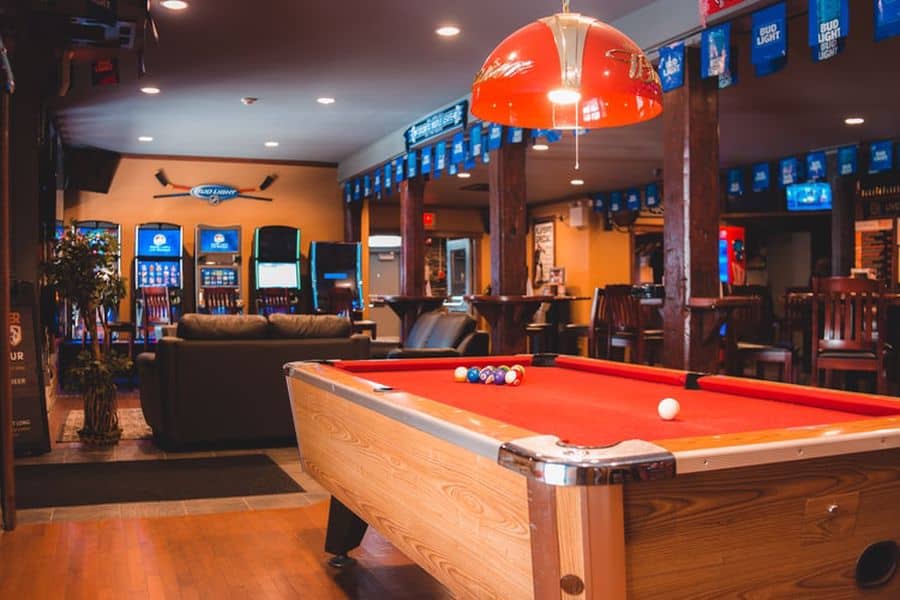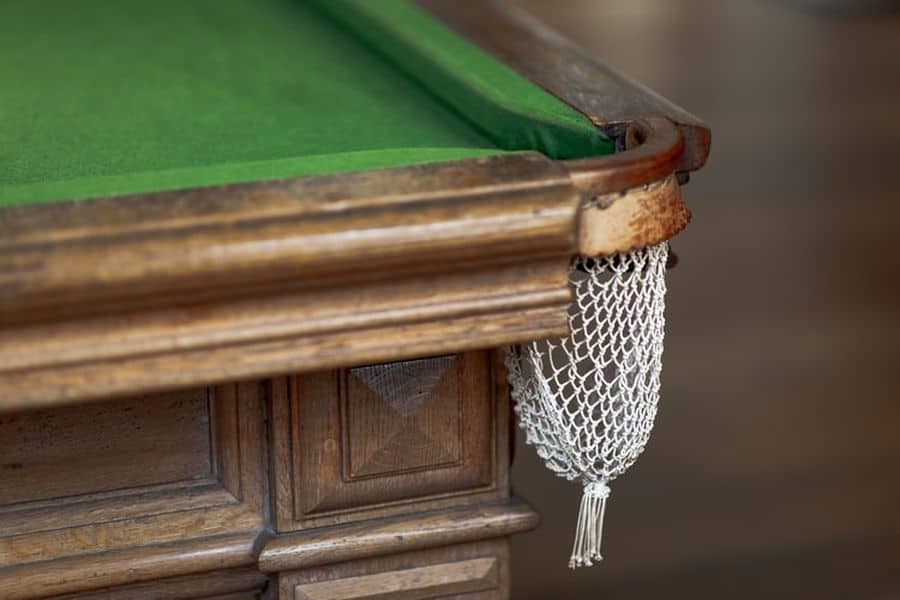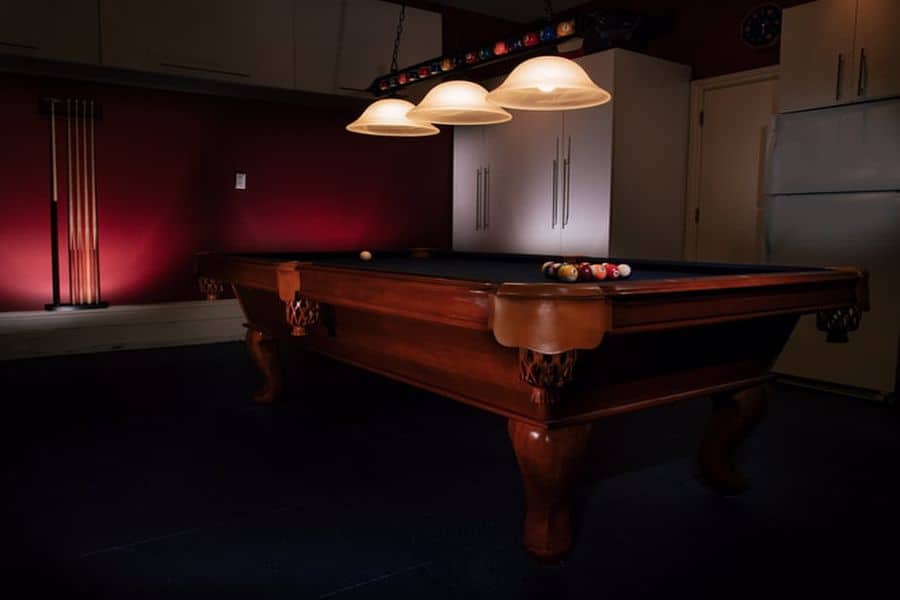As an Amazon Associate we earn from qualifying purchases.
Pool is a very popular game and mostly common in every club, house, or basement. However, whether you are a club owner or an individual who wants to bring a pool table to your property, some things might confuse you. One of those confusions is choosing the right type of pool table.
Therefore, you need to have a generalized idea about the differences and similarities between the major types of pool tables.
Slate vs Wood Pool Table
The bed of a pool table is covered with a felt for seamless gameplay. However, the composition of the bed underneath is what will determine the playability of the table. Furthermore, the material of that pool table bed decides the cost, weight, and longevity of the table.

Therefore, to help you eradicate the conflict, this guide details Slate vs. Wood Pool Table.
Specifications of Slate Pool Table
Slate is made up of several minerals that include clay, quartz, and mica, with fine grain. A slate pool table consists of 1 or 3 slate pieces. They are also known as machined-rock pieces. Also, they are strong and durable.
The specialty of slate is that you can get it polished into a seamless flat top for the smooth execution of table games.
The thickness of the slate pool tables usually varies in terms of thickness between ¾ to 2 inches. The usual weight of a slate table bed is around 450 to 600 lbs. The reason for which the slate pool tables are of three different pieces is to ensure ease of transport.
The thickness of the slate decides its potential to stay in a flat state for a long time. Therefore, the preferable thickness for the slate pool table is 1 inch. Moreover, the thickness of a slate pool table also decides its strength and price.
Specifications of Wood Pool Table
A wood pool table is yet another type for good gameplay and has other perks. Medium-Density Fiberboard (MDF) wood is a preferable option for crafting out wood pool tables. It is a combination of softwood and hardwood fibers and undergoes gluing process with the help of resin.
Wood is a cost-effective alternative to slate for pool tables. Moreover, working with wood to make desirable-sized pool tables is easy than slate. People use different wood types to make pool tables; however, different wood results in different outcomes that might positively or adversely affect the game.

Therefore, it is advisable to use only the well-matured hardwoods for the pool table. This will not just offer an amazing table but will also give long durability to it. Moreover, unlike slate, it is easy to transport and dismantle at the time of need.
Slate vs Wood Pool Table
Similarities
- Both slate and wood pool tables can be made in single or three pieces.
- The thickness of both of them contributes to better pool games.
- All types of felts are compatible with both wood and slate pool tables.
Differences
- Cost- Slate is a natural rock made out of minerals that makes it way too expensive. It is so because slate is difficult to source, and machining it is also crucial. Therefore, picking up a slate pool table requires heavy investment. On the other hand, wood pool tables are around 25 to 50% less expensive than slate pool tables.
- Warping- A slate pool table has no such concerns of warping or bending over time. However, wood or MDF pool tables do absorb moisture and experience change due to temperature and humidity. Therefore, there is a high chance that wooden pool tables might bend or warp over time, making it difficult for players to play games.
- Playability- The games played over wooden pool tables are usually a bit slower than slate pool tables. The ball rolling is better over a slate surface, which will give you comparatively a better gameplay experience.
- Long-Lasting Quality- The slate pool tables come with a lifetime warranty. But the wooden pool tables are not proficient for such assurance. Slate tables blend with high-quality frames to improve their longevity, as compared to wood. Jump shots will damage the wood table but not the slate table. Hence, slate tables are more durable and long-lasting.
- Weight- The weight of wooden pool tables is less than that of slate tables. Hence, the transportation and dismantling hassle is less for wood tables.
- Size- Smaller-sized wooden pool tables are picked for kids or beginners to learn and enjoy the game. With slate pool tables, the options of sizes are a bit less, as they are preferable more for professional games.

Major Distinguishing Factors
The level of rigidity or pressure distribution potential of wood and slate pool tables is the major distinguishing factor. When one strikes a ball on a wooden pool table, it slightly bends due to pressure.
A slate pool table doesn’t bend when it comes in contact with pressure. It is because slate is high on horizontal resilience.
When To Use Slate Pool Table?
A slate pool table is a perfect inclusion when you are making a permanent playroom. It means that if you own a club or a playhouse, where the pool table will be placed, without the necessity of changing its position anytime sooner, then a slate pool table is an ideal pick.
When To Use Wooden Pool Table?
A wooden Pool table is for the people who want a personal pool table at their residence or clubhouse. It is also preferable at private clubs or pubs but in rare cases. One should use a wooden pool table if there is a need for frequent relocation or dismantling.
It is lightweight, and you can transport or move it around the property easily.
Final Verdict
Slate pool tables are quite worthier in terms of quality, rigidity, and resilience. They are durable and support magnificent gameplay. However, they are heavy and expensive. Wooden pool tables might be less proficient in terms of quality but are ideal for beginners who want to spend less on their pool tables.
It depends upon you to choose the best among the two, considering the facts mentioned above.